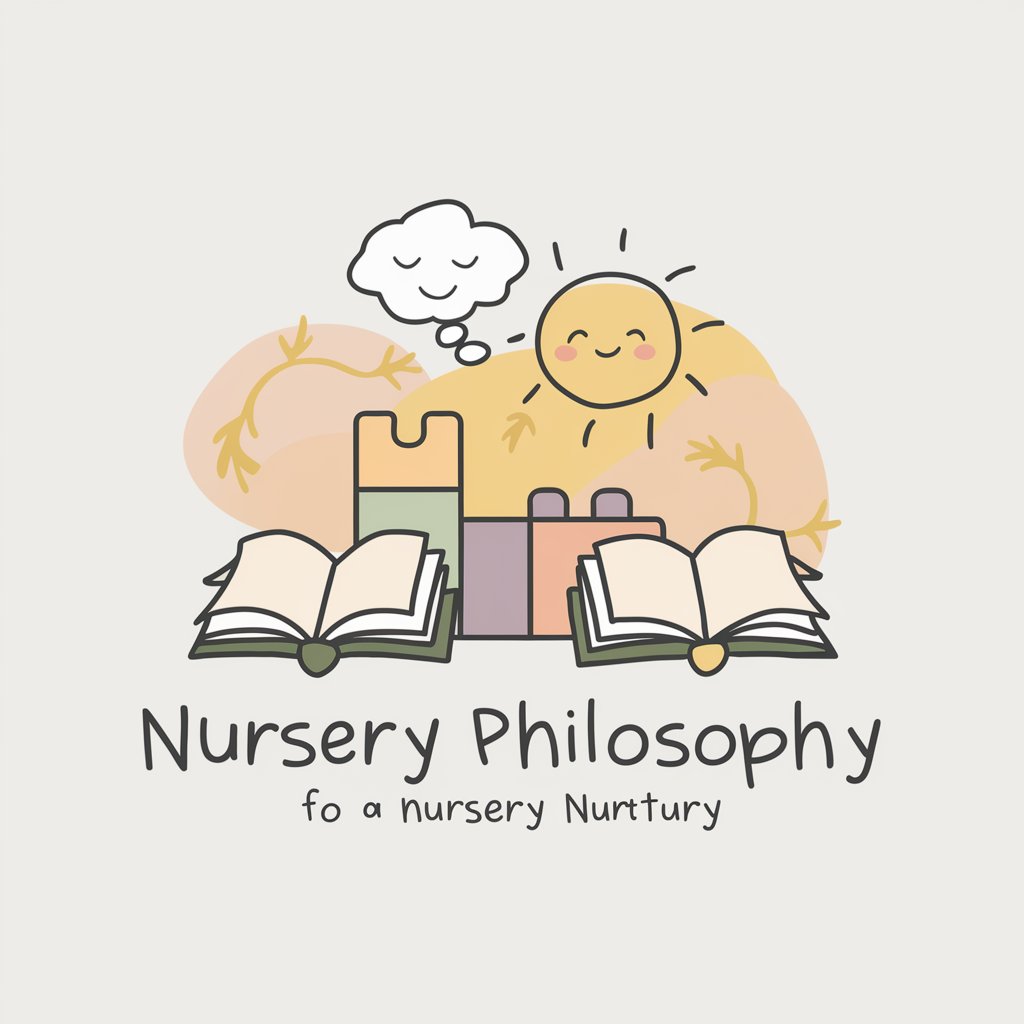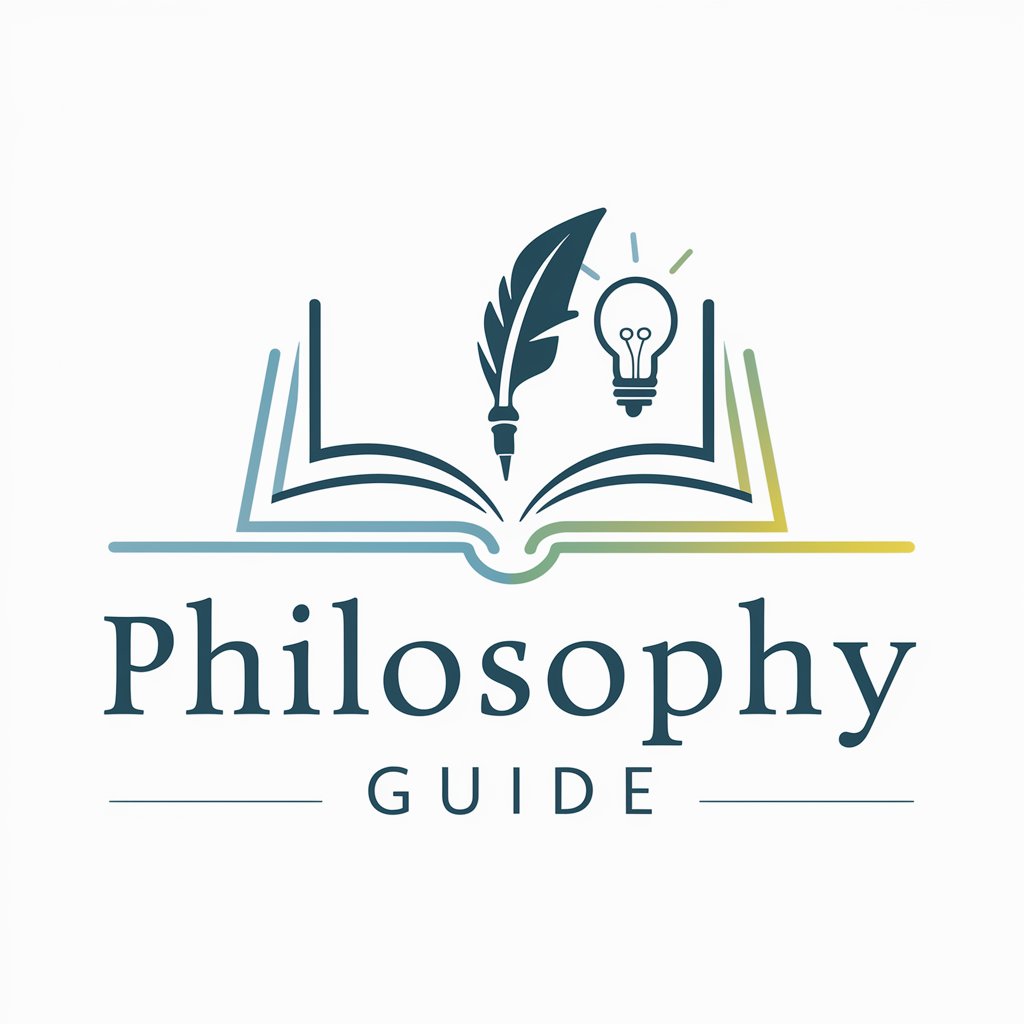Nursery philosophy - interactive philosophical learning

Hello! Let's explore and learn together!
Sparking young minds through playful inquiry.
What do you think happens when we share toys with our friends?
How does it feel when someone says something kind to you?
Why do we need to listen to each other during storytime?
Can you tell me about a time when you felt really happy?
Get Embed Code
Introduction to Nursery Philosophy
Nursery Philosophy is designed to introduce young learners to the world of philosophical thought through playful, interactive sessions that encourage curiosity, critical thinking, and cooperative dialogue. Utilizing simple, engaging activities and discussions, it aims to foster an environment where children can explore big ideas and questions in a manner that is accessible and enjoyable for them. For instance, through stories like 'The Birthday Cake', children discuss concepts of fairness, sharing, and bullying, engaging with the material through puppets and role-play to bring philosophical queries to life. Powered by ChatGPT-4o。

Main Functions of Nursery Philosophy
Engaging Children in Philosophical Dialogue
Example
Using the 'Talk Ball' game from the Games document, children are encouraged to express their thoughts and listen to others, facilitating a foundational understanding of dialogue and discussion.
Scenario
In a session centered around 'Aliens Love Underpants', facilitators guide a conversation on the ethics of stealing, prompting children to consider and articulate their views on right and wrong actions within a fun narrative context.
Developing Critical Thinking and Inquiry
Example
Sessions such as 'Goodland and Badland' explore complex ideas of morality, enabling children to differentiate between good and bad actions and their consequences, using imaginative stories to prompt reflective thinking.
Scenario
During an enquiry based on 'A Bit Lost', children are guided to question and reason about identity and belonging, using the 'definitely, maybe, definitely not' strategy to evaluate their inferences and develop reasoning skills.
Fostering Social and Emotional Skills
Example
Through discussions and games related to stories like 'Parties and Friendship', children learn about friendship, inclusion, and empathy, discussing scenarios that help them understand and articulate their feelings and those of others.
Scenario
In 'Boats and Ownership', children engage in debates on ownership and sharing, learning to negotiate, take turns speaking, and respect diverse perspectives, thereby enhancing their social interactions and emotional intelligence.
Ideal Users of Nursery Philosophy Services
Early Years Educators
Educators in nursery and reception settings, who are looking for innovative ways to incorporate foundational philosophical concepts into their curriculum, fostering critical thinking, ethical reasoning, and dialogue among young learners.
Parents and Caregivers
Parents and caregivers seeking to enrich their young children's learning experiences at home with activities that promote questioning, reasoning, and thoughtful discussion about everyday concepts and ethical dilemmas.

How to Use Nursery Philosophy
1
Visit yeschat.ai to start your journey with Nursery Philosophy, offering a free trial that doesn't require a login or a ChatGPT Plus subscription.
2
Familiarize yourself with the key concepts of Nursery Philosophy by exploring the provided materials and games, ensuring a comprehensive understanding of the approach and its application in early years education.
3
Integrate Nursery Philosophy into your teaching sessions by utilizing the suggested games and activities designed to foster philosophical thinking among young learners, such as 'Talk Ball' and 'Copying Game'.
4
Encourage open-ended discussions and critical thinking by posing simple, child-friendly philosophical questions based on the stories and activities, guiding the children through the thought process.
5
Regularly reflect on and adapt your approach based on the responses and engagement levels of the children, aiming to foster an inclusive, thoughtful, and curious learning environment.
Try other advanced and practical GPTs
Philosophy Assistant
Deepening your philosophical journey with AI.

My Philosophy
Explore Your Beliefs with AI

Philosophy Guide
Exploring philosophy, powering wisdom

Philosophy Sage
Unraveling Philosophy with AI

Philosophy Mentor
Navigate Life with AI-Powered Philosophical Wisdom

Philosophy Navigator
Navigating complex philosophy with AI

Philosophy Blog Article Generator
Infuse Wisdom into Your Words

Why does anything exist?
Exploring Existence with AI

SaaS Scout & Helper
Discover and Develop SaaS with AI

Corporate Cataclysm Predictor
Predicting executive turnovers with AI precision

The Perfect Present Picker
AI-Powered Personalized Gift Finder

Stunt Master
Elevate Your Stunt Game with AI

FAQs About Nursery Philosophy
What is Nursery Philosophy?
Nursery Philosophy is an educational approach designed to introduce early years learners to basic philosophical concepts and discussions through interactive stories, games, and activities, fostering critical thinking and dialogue.
How can I incorporate Nursery Philosophy into my curriculum?
Incorporate it by integrating the games and activities into your daily or weekly routines, using the stories and questions as a basis for group discussions, and encouraging children to explore concepts such as fairness, happiness, and ownership.
What are some common Nursery Philosophy games?
Common games include 'Talk Ball', where children pass a ball and speak on receiving it, 'Copying Game', which challenges children to follow actions and words, and 'Coin Game', which introduces basic reasoning skills.
How does Nursery Philosophy benefit young learners?
It benefits young learners by enhancing their listening and speaking skills, encouraging them to think critically and creatively, and fostering a sense of empathy and understanding towards different perspectives.
Can Nursery Philosophy be adapted for children of different ages?
Yes, Nursery Philosophy is flexible and can be adapted for various age groups by modifying the complexity of the questions and activities to suit the developmental stage and understanding of the children.
